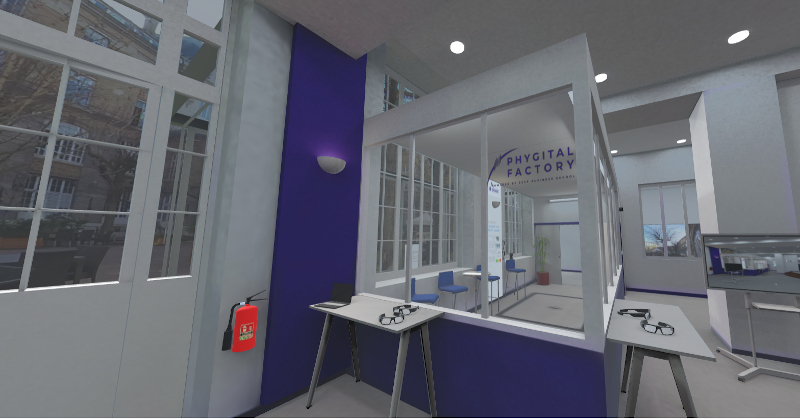Phygital as a contraction of ‘physical’ and ‘digital’ is a combination of the use of digital elements in a physical environment to enhance the learner’s experience. Even before the COVID-19, education was already facing the transformation of its practices due to the digital revolution. With the pandemic, education has massively shifted into a phygital mode. Higher education transformation plans should give greater emphasis to experiential learning through campuses.
By Anthony Hié
Chief Digital Officer
ESCP BS
LinkedIn
The importance of Phygital Factories inside campuses
The first Phygital Factory at ESCP Business School is therefore not a virtual campus, it is a place of exchange and co-creation that allows students and professors to experiment and learn how to manipulate digital tools, but also to transform and spread them to the whole campuses. It consists of 3 adjacent spaces, each with specific facilities & possibilities. In the 1st room, a DESIGN space allows the use of innovative tools such as a digital flip chart or a smart projector which transforms any surface (board, desk, wall, etc.) into a touch screen in a design thinking approach. In the 2nd SHARE space, students can follow immersive experience modules through high-level virtual reality, or collaborate in the digital twin of the Phygital Factory. Among the experiences offered, there is, for example, training students for public speaking in front of a virtual amphitheatre that is more real than life, getting ready for a job interview via a full immersive simulation. Finally, the 3rd MAKE space is available to those who wish to create original digital educational content in micro learning or augmented reality mode.

Unlike the classic “Digital Factory” where everything is dematerialized, the Phygital Factory allows contributors to see and, above all, to touch by materializing innovation through concrete tools whose hybrid applications[1], both virtual and physical, have a phenomenal growth potential for higher education. We believe that this concept is able to create the best conditions for innovation in both process and pedagogical aspects by relying on collective intelligence and the connecting logic between DESIGN, MAKE and SHARE spaces.
The setting up of an open innovation platform open to a larger community (students and external) and called “Openeo” is also an integral part of the overall phygital approach. This encourages the stake-holders to think about innovation and its impact not from a closed perspective, but by integrating collaborations outside the institution with other institutions or partners.
Adding a DataLab to improve quality & give insights
The global volume of digital data production is growing at a never seen rate and the field of education is no exception. Bigdata reflects both this explosion of data and the ability to process it in record time. The issue of data-driven management remains a huge challenge for higher education institutions, as there are so many types of data to cross-reference and analyse. These data are a goldmine for improving the quality of information, contributing to the improvement of the evaluation system related to academic excellence, meet accreditation requirements or offer personalised services to students. The implementation of a DataLab should be part of a global transformation process to make the organisation more agile and efficient. Indeed, digital technology and data feed many services in higher education institutions: accreditation, faculty, teaching departments, finance, learning analytics, organisational processes, marketing, smart building…
It will then be possible to map the student’s journey from enrolment to graduation and beyond (long life learning) based on the analysis of several sources of information. This is one of the keys to improve the student experience based on the analysis of the results and the action plans that will follow. This organisation must therefore concentrate data analysis tools and multidisciplinary talents to collaborate and bring out the relevant information. These discovering will be one of the key to competitive advantage between the best business schools and further success.
Keeping the student & human centric approach
The phygital transformation is now taking place at the very heart of the institutions, not only across the boards but also through all communities. The entire organisational culture is impacted within higher education institutions and need a change management process that is also adapted. However, from the student’s point of view, the expectation goes beyond the learning objectives, it is to have a complete experience through the campuses. This evolution is reflected in the implementation of an information system centred on the student, before, during and after his or her studies, but also and above all by exchanges and co-construction of services in a permanent dialogue with the students. The fact remains that the role of the human being will continue to evolve in digital education while remaining decisive, whether in the design or in the support of a “hybrid” educational system.
Footnotes
| ↑1 | The last “2021 EDUCAUSE Horizon Report: Teaching and Learning Edition” identify in the macro trends a widespread adoption of Hybrid Learning Models and Open Education Resources in the next few years. |
|---|

0 Comments